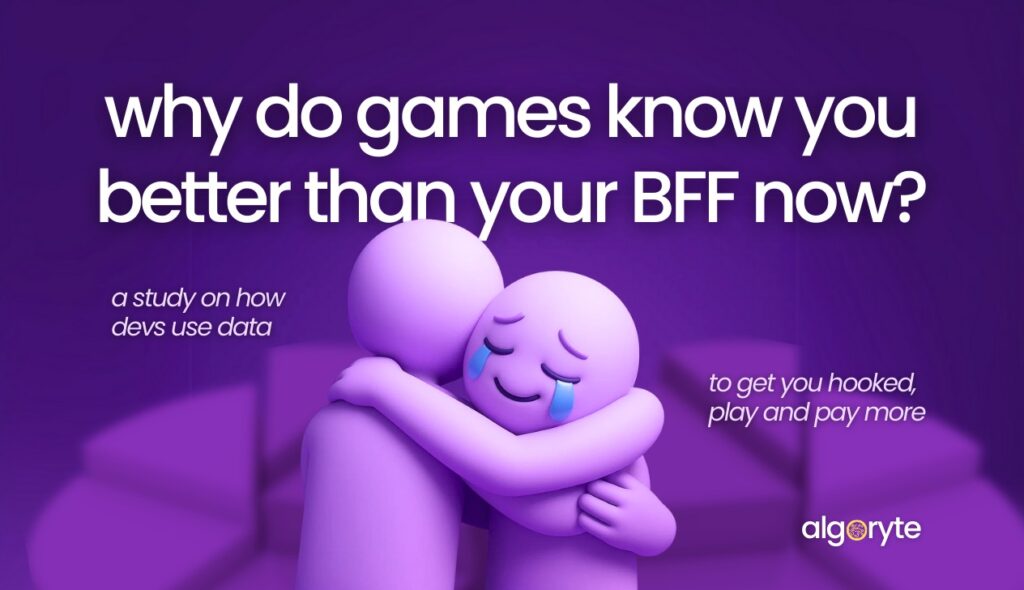
Why do Games Know You Better Than Your BFF Now?
(a.k.a. why numbers lowkey decide whether your game flops or pops)
Let’s be real:
Game dev used to be about vibes, passion, and a little chaos.
Now? It’s about vibes plus data — and that combo is changing the entire game (literally).
Whether you’re building a cozy farm sim or launching a battle royale beast, data analytics has become your bestie. Why? Because it shows you what players really do, not just what they say.
Let’s break it down.
1. Data = Your Game’s Truth Serum
You can’t improve what you can’t measure.
Data analytics helps devs answer questions like:
- Where do players drop off during onboarding?
- Which level is rage-quitting central?
- What’s the most-used character, weapon, or skin?
In Call of Duty: Warzone, weapon pick rates and kill/death ratios are constantly analyzed to rebalance gameplay.
Subway Surfers monitors session times to adjust pacing and ad frequency.
League of Legends collects everything — from champion win rates to team compositions — to patch meta shifts quickly.
🧠 Smart devs don’t just guess. They test, tweak, and re-launch.
That’s how games like Genshin Impact, Clash of Clans, and Apex Legends stay fresh.
2. Player Retention Isn’t Luck — It’s a Science
One-time downloads are cute.
Daily active users? That’s the real flex.
By tracking player behavior, you can spot where users get bored or burnt out. Then you use that intel to drop fresh content, optimize difficulty curves, or trigger retention events right before they dip.
- Homescapes uses A/B testing to check if changing the reward system or altering task difficulty affects Day 7 retention.
- Valorant monitors heat maps to tweak map design, making sure gameplay stays balanced and exciting.
- The Sims 4 used player data to prioritize expansion packs (like pets or seasons) based on the most-used mod themes in the community.
3.Monetization Without the Ick
Nobody wants a game that screams “PAY UP” every two minutes.
But monetization can be smooth and player-friendly — when it’s backed by data.
Analytics helps you figure out:
- Which offers convert best?
- What price point feels fair?
- Who’s most likely to spend (and when)?
Candy Crush Saga mastered this. Based on where players get stuck, it offers tailored power-ups right when you’re most frustrated.
PUBG Mobile uses regional spending data to optimize battle pass pricing.
In FIFA Ultimate Team, player pack probabilities are updated regularly to reflect demand, creating a cycle of hype (and revenue).
4. Data = The Ultimate Marketing Hack
Let’s talk about launch strategy.
You’ve got the game, now you need the players.
Marketing teams use data to:
- Identify your core audience
- Tailor messaging for each region, channel, or vibe
- Predict what creatives will slap (before spending $$$ on ads)
Among Us went viral during the pandemic thanks to Twitch + TikTok + timing. But behind the scenes, InnerSloth tracked new player spikes and tailored updates (like proximity chat mods) to keep momentum going.

Minecraft Dungeons saw stronger engagement in the US vs. EU — so Microsoft localized events differently based on regional analytics.

Pro tip: The marketing isn’t just about who you’re targeting — it’s about when. And data gives you the perfect timing.
5. LiveOps + Analytics = A Dynamic Duo
You already know LiveOps is for keeping games alive post-launch.
But here’s the tea: data decides which events work and which ones need to retire.
Brawl Stars rotates game modes based on player activity and feedback.

Destiny 2 adjusts event rewards, raid difficulty, and even storytelling choices based on how the community responds.
Say you run a leader board event, and only 8% of players engage.
Next week, you try a solo progression event, and engagement hits 30%.
Boom. You just found your secret sauce.
TL;DR
Data analytics isn’t just for big studios with giant dashboards and analysts.
It’s the cheat code every game studio — indie or AAA — needs in 2025.
From development to retention to monetization and marketing, data helps you:
1 )Build smarter
2) Monetize better
3) Grow faster
4) Market louder
And keep players coming back
So if you’re not using analytics in your game yet…
You’re basically throwing darts in the dark — while everyone else has night vision goggles.
Alright, your turn 🎮👇
What’s that one game you can’t stop playing?
About Algoryte
At Algoryte, we’re more than a Software development company — we’re innovators, creators, and problem-solvers.
- At Algoryte, we’re not just providing game development services.
- Explore our other services: VR/AR/, Web3, and blockchain innovation
- Curious to see more of our work? Dive into : Yetiverse | Landverse
- Stay connected with us on X | LinkedIn | Instagram
- Discover more content at Algoryte.com | Substack | Medium






One Response